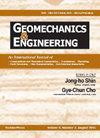Centrifuge modelling of rock-socketed drilled shafts under uplift load
IF 2.4
3区 工程技术
Q2 ENGINEERING, CIVIL
引用次数: 0
Abstract
Rock-socketed drilled shafts are widely used to transfer the heavy loads from the superstructure especially in mountainous area. Extensive research has been done on the behavior of rock-socketed drilled shafts under compressive load. However, little attention has been paid to uplift behavior of drilled shaft in rock, which govern the overall behavior of the foundation system. In this paper, a series of centrifuge tests have been performed to investigate the uplift response of rock-socketed drilled shafts. The pull-out tests of drilled shafts installed in layered rocks having various strengths were conducted. The load-displacement response, axial load distributions in the shaft and the unit skin friction distribution under pull-out loads were investigated. The effects of the strength of rock socket on the initial stiffness, ultimate capacity and mobilization of friction of the foundation, were also examined. The results indicated that characteristics of rock-socket has a significant influence on the uplift behavior of drilled shaft. Most of the applied uplift load were carried by socketed rock when the drilled shaft was installed in the sand over rock layer, whereas substantial load was carried by both upper and lower rock layers when the drilled shaft was completely socketed into layered rock. The pattern of mobilized shaft friction and point where the maximum unit shaft friction occurred were also found to be affected by the socket condition surrounding the drilled shaft.抬升荷载作用下嵌岩钻杆的离心模拟
嵌岩井被广泛应用于上部结构的重荷载传递,特别是在山区。对嵌岩钻杆在压缩载荷作用下的受力特性进行了大量的研究。然而,岩石中钻孔竖井的隆升行为却很少受到重视,而隆升行为决定着基础体系的整体行为。本文通过一系列离心试验研究了嵌岩钻井的隆升响应。在不同强度的层状岩层中进行了钻孔井的拔井试验。研究了拉拔荷载作用下的载荷-位移响应、轴向载荷分布和单元表面摩擦分布。研究了岩套强度对基础初始刚度、极限承载力和摩擦动员的影响。结果表明,岩穴特征对钻孔竖井的隆升行为有显著影响。当钻杆完全嵌套于层状岩石中时,上、下两层岩石均承担了较大的载荷,而当钻杆完全嵌套于层状岩石中时,上、下两层岩石均承担了较大的载荷。运动轴的摩擦模式和最大单位轴摩擦发生的点也受到钻井轴周围套筒条件的影响。
本文章由计算机程序翻译,如有差异,请以英文原文为准。
求助全文
约1分钟内获得全文
求助全文
来源期刊

Geomechanics and Engineering
ENGINEERING, CIVIL-ENGINEERING, GEOLOGICAL
CiteScore
5.20
自引率
25.00%
发文量
0
审稿时长
>12 weeks
期刊介绍:
The Geomechanics and Engineering aims at opening an easy access to the valuable source of information and providing an excellent publication channel for the global community of researchers in the geomechanics and its applications.
Typical subjects covered by the journal include:
- Analytical, computational, and experimental multiscale and interaction mechanics-
Computational and Theoretical Geomechnics-
Foundations-
Tunneling-
Earth Structures-
Site Characterization-
Soil-Structure Interactions
 求助内容:
求助内容: 应助结果提醒方式:
应助结果提醒方式:


